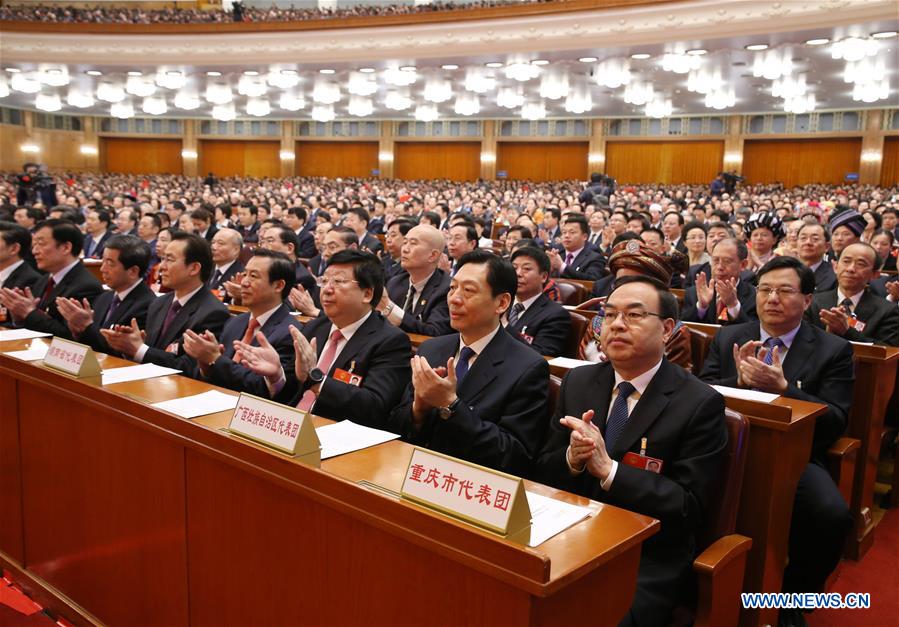21st century convergence: China's regulatory mergers
- By Eugene Clark
 0 Comment(s)
0 Comment(s) Print
Print E-mail China.org.cn, March 29, 2018
E-mail China.org.cn, March 29, 2018

One of the many important outcomes of China's recently held "two sessions" was the announcement of China's plans to merge its banking and insurance regulators as part of sweeping changes to its central government structure. The major goal behind this move is to reduce systemic risk in the financial sector.
On a wider scale this development makes sense for it recognizes the growing convergence of business services. Insurance and banking services have expanded in their own right as each has sought to look for new markets. More than that, today, tech companies, e-commerce platforms such as Alibaba, mobile phone companies, and even department stores like Wal Mart, have expanded their scope and range of services, including offering financial services and financial products that were formally provided by the financial and insurance industries.
There are, of course, many different dimensions of the convergence between the banking, the insurance, the investment, the pension and other industries. Today, many financial firms act as true business services supermarkets, offering a very broad range of products. As a result of deregulation, today financial and other institutions are allowed more and more to offer complimentary or competing products, that were originally the closed privilege of neighboring financial sectors.
With digitization and the demand of consumers for one-stop shopping, the boundaries have become even more blurred within the finance and insurance sectors and between them and new aspirants, including fintech companies. Today there are many different types of players and new and interrelated products, services and technologies that have dramatically and forever changed the financial and insurance industries.
In the face of this industry convergence, no longer acceptable are older strategic and regulatory models founded upon industry-centric thinking. The reality is that the traditional "silo" model and what is an "industry" has broken down.
In this era of disruption and convergence, business services, including banking and insurance have substantially converged and the boundaries between industries continue to shift ground. Products and services have become digitized and digital platforms connect billions of people around the world in ever more complex networks of data and exchange. These and related developments were described by Thomas Friedman, in his popular work, The World is Flat.
In this rapidly changing, disruptive and convergent reality, there are both opportunities and risks. For government regulators there is understandable uncertainty and anxiety. There is concern about consumer protection, stability, safety and dangers of negative contagion that could be especially impactful for developing economies such as China's. For government and regulatory authorities, these new realities require new and more flexible rules that promote innovation while at the same time protecting consumers, managing risks and ensuring a fair, stable, open and transparent competitive environment.
In an era of rapid change and moving boundaries, there is also a need for reliable and comparable data so that governments gain transparency about what is happening. Among the many areas which need attention are: reforms of capital policy, development of the appropriate regulatory infrastructure, improved asset liability management, the development of appropriate accounting and reporting systems, taxation policy, privacy, competition rules, transparency and consumer protection.
These developments occurring in an Information Age also present many challenges to every institution in society. In my profession of law, for example, a few decades ago areas such as computer law, intellectual property, and competition law were specialties confined to large firms or boutique firms with specialized practices. Modern technology and business practice are now converging and making it necessary for all commercial lawyers to be aware of these developments.
In addition, yesterday's specialists must today increasingly link to and work with other specialists not only in law, but also in technology, management, business, government and other areas. Today, law firms themselves produce information products, law software applications and more. In this resultant legal and managerial age of uncertainty, new experts must emerge who have both the technical depth and overall breadth of vision to "manage" the realities of this new information age.
The pace of change, the breadth and depth of technological advancement, the national and international scope of the commercial world - all call for new technological and regulatory Vikings willing to build new types of boats and launch them and their crews into unchartered seas with unknown dangers and uncertain outcomes.
It is also important that the world's universities prepare professionals for this new environment by giving them the survival, adaptation and innovation skills that will enable them to succeed. It is not enough to advise clients about the present inadequate state of law, management and regulation.
Tomorrow's graduates must have the basic skills, experience, understanding and wisdom to predict, guide and lead the way forward. For those already in the professions, it is important aim of continuing professional education to provide those previously bound within one specialization with assistance in coping with this new convergence of business, law, management, and technology.
The overarching theme was reflected in Bob Dylan's - "The times they are a chang'n." Accordingly, we must prepare not only for the world as it is, but also for what it will and can be. Indeed, the future success and sustainability of the world's economy depend upon it.
Eugene Clark is a columnist with China.org.cn. For more information please visit:
http://m.91dzs.com/opinion/eugeneclark.htm
Opinion articles reflect the views of their authors only, not necessarily those of China.org.cn.





